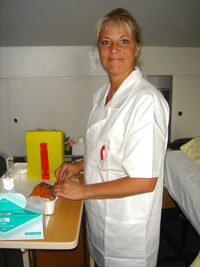Unit 3. People working at a hospital

Photo: Benutzer:DRK FSA-Bochum
License: Creative Commons BY-SA. 3.0
Throughout the world, communities rely on the numerous people trained to take care of their health, from birth to death.
There are many different personnel in hospitals, clinics and in the community with different roles to play:
WHO ARE THEY AND WHAT DO THEY DO?
Doctor/Physician: diagnoses a patient’s problems and prescribes treatment. Abbr. “Dr”. In the UK, surgeons are traditionally not called “Doctor” but are addressed as “Mr”. “Mrs”. Etc.
A family doctor is usually known as the GP (General Practitioner) and he or she works from a surgery. (Surgery: consultorio/consulta)
Consultant: a doctor who is a senior specialist in a particular branch of medicine and who is consulted by a GP.
Eg: She was referred to the consultant orthopaedist.
(“MD” stands for “Doctor of Medicine”)
Nurse: a nurse looks after the daily needs of patients in hospital and acts as intermediary between doctors and relatives.
There are many types of nurses and they can be classified depending on different aspects: the level of education achieved, their medical speciality. The main kinds of nurses according to the level of education are the following:
- An LPN (Licensed practical nurse) usually has less than 2 years of training. They perform simple and some complex medical procedures. They work under other health care professionals to provide patient care.
- An RN (Registered Nurse) has a university degree in nursing and often is responsible for supervising the tasks of LPNs. RNs provide direct care, patient education and make decisions about proper patient care.
- An APN (Advanced Practice Nurse) has a masters or doctoral degree. They provide direct care, diagnose disease, prescribe medication, work in research and educate patients and other healthcare professionals.
- Surgeon: operates on patients and visits patients daily post-operatively to order any change in treatment.
- Anaesthesist: puts patients to sleep before an operation or gives local or spinal anaesthetic before an operation.
- Radiographer: takes X/Rays, MRI (Magnetic Resonance Imagining) and CAT scans (Computerised Axial Tomography).
- Physiotherapist: exercises injured limbs-arms and legs and helps patients with post-operative breathing exercises.
- Pharmacist: prepares and dispenses medications and can give advice about the quantity of a drug to give (dosages).
- Dietician: decides what food a patient can eat and organizes different diets for ill patients.
- Speech therapist: assists people of all ages who have problems communicating.
- Laboratory technician: tests specimens of urine, blood, sputum etc. for abnormalities.
- Chiropodist: looks after injured or diseased feet.
- Paediatrician: specializes in the treatment of the diseases of children.
- Occupational therapist: teaches patients to live as normally as possible with a disability.
Vocabulary revision
Match up the person with the correct definition:
a) consultants b) physiotherapists c) ward sisters/charge nurses
d) plastic surgeons e) speech therapists f) chiropodists
g) social workers h) medical laboratory scientific officers i) radiographers
j) dieticians k) porters l) pharmacists m) laundry staff
n) general practitioners o) paediatricians p) occupational therapists
1. They assist patients who have difficulties speaking.
2. They take care of people’s feet.
3. They work together with medical personnel in hospital and try to deal with a patient's problems at home.
4. They clean and organize bed linen.
5. They move patients on trolleys, beds and wheelchairs.
6. They work out special meals and give advice on the most appropriate food.
7. They are responsible for, prepare and dispense medicine.
8. They are specialized in children.
9. Senior medical people who give expert advice and are responsible for final decision making.
10. They give massage and exercise to restore specific bodily functions.
11. They operate on patients to repair skin damage or improve a patient's appearance.
12. Their work is rehabilitation and assistance of people recovering from or suffering from illness.
13. They operate equipment in the X-ray department.
14. They work in the departments which are responsible for specimens.
15. They are responsible for running and organizing a ward or department.
16. These doctors may refer their patients to hospital to see a specialist or to receive specialist care.